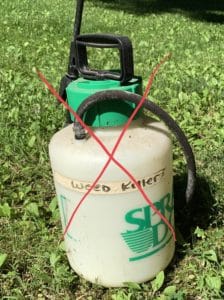Hello, fellow lovers of all things green. I have a long-standing client who considered using Roundup to tend to the weeds in walkway. Instead, I provided safe alternatives to harmful weed killers. But the best part is sharing life stories.
A few years back, I dug in with Andrew of Sparta, NJ, who wished to enhance his gardens in time for hosting pre-prom photos for his daughter. He was expecting sixty with friends and parents. I recall how Jessica came home from school fifteen years ago when I first worked with Andrew and grabbed her play trowel to join me in planting perennials. She got a special kick out of tickling the roots – loosening them with her fingertips to encourage them to spread widely in their new home.
Gardening has a way of bringing people together.
While planting with Andrew, we chatted about our life experiences. Both of us had gone through a heartbreaking divorce. We shared lessons learned and the healing and growth that has occurred since. I asked if he knew the parents who were coming for pre-prom.
“Not really. Maybe we met on a soccer field, but I don’t socialize much. With work and caring for things around the house, I’d rather be with the kids.”
I admire Andrew’s commitment to his children; all three have grown solid roots.
The History of Roundup Weed Killer and the Now-controversial Glyphosate
As we ended our day, he mentioned buying Roundup to spray the joints in his walk. Roundup has already been banned or restricted in many countries.
“Have you heard about the lawsuits about Roundup causing cancer?” I asked.
“I think they may be exaggerated,” Andrew said.
You may know the history of Roundup developed by Monsanto in the 1970s; the primary ingredient is the now-controversial Glyphosate. In the late 1990s, Monsanto developed genetically modified seeds (GMO) immune to Roundup. Since then, they built an enormous international business selling Roundup and GMO seeds so food producers could spray their crops to kill the weeds but not the harvests. In recent years, billions have been awarded in lawsuits against Bayer for Roundup allegedly causing cancer.

Choose Safe Alternatives to Harmful Weed Killers.
Safe Off-the-Shelf and DIY Alternatives to Roundup
Instead of rattling what I’ve read, I recommended the people and pet-safe Burnout Weed Killer by Bonide, a mixture of citric acid and clove oil. There are also homemade recipes like 1 gallon of household white vinegar and 1 cup of table salt mixed with one tablespoon of liquid dish soap. Or a 1-gallon vinegar, 2-cup Epsom salt, and a quarter-cup dish soap potion a few local Garden Club members swear by.
With or without salt, vinegar is nonselective in what it kills, including desired plants. Household vinegar will only kill the foliage, though added salt gives a one-two punch. However, the salt will remain in the soil, which is not good in the garden, as you can tell by plants impacted by road salt.
There’s a 20 percent horticultural-grade vinegar that will kill roots and foliage, but it’s especially caustic if inhaled or in contact with your skin or eyes, so wear protection. Some say adding one cup of orange or citrus oil to a gallon of horticultural vinegar is far more effective.
I’d only consider using salt with vinegar or horticultural vinegar for persistent weeds in gravel driveways and paths or gaps in walkways. To be effective, they should be applied on a sunny, above 70-degree dry day with no rain in the forecast. Then, keep pets away for a few hours until the application dissipates.
A Happy Ending
I met with Andrew again this spring, and he told me his plans to remarry. He wished to spruce up his landscape with some rejuvenation pruning in the spirit of combining his life with his soon-to-be bride.
The day before leaving for his wedding, I stopped by to check on the project. His youngest daughter Jessica, now 22, was there. She will join her siblings to witness the father’s commitment to his new bride. Life is a journey of hardships followed by joy —if we trust and live in gratitude even during challenging times.
Bayer is fighting hard to defend and preserve the ongoing use of Glyphosate and Roundup, so it’s up to food producers and consumers to choose differently. I’ll pick the safer remedies and buy non-GMO foods. How about you?
Garden Dilemmas? AskMaryStone@gmail.com and your favorite Podcast App.
There’s more to the story in the Garden Dilemmas Podcast (10-soothing minutes):
Related Stories & Helpful Links:
Glyphosate Report by Bayer Jul 1, 2024
New York Times article about Monsanto / Bayer Roundup Lawsuit Settlements by Maureen Farrell (Dec. 6, 2023)




